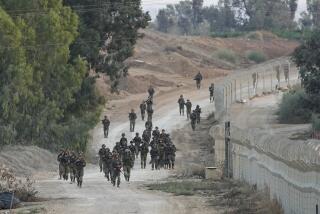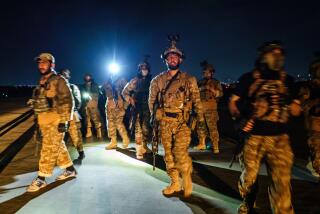In Afghanistan, not-so-smart intelligence
- Share via
Shortly before a double agent for Al Qaeda detonated a suicide bomb and killed seven CIA employees in Afghanistan last week, a U.S. general issued a report excoriating American military intelligence-gathering for being too focused on targeting enemy combatants at the expense of understanding civilians and the environment around them. Though unrelated, both developments highlight deep and enduring problems for the United States eight years into the war.
The suicide bomber was a Jordanian doctor recruited to infiltrate Al Qaeda at the highest level. Instead, he turned on his handlers like a Cold War spy and then, apparently steeped in religious fanaticism, blew himself up on a U.S. base along with the high-level CIA operatives. Casualties are inevitable in war, and the attack demonstrates the sophistication and adaptability of Al Qaeda; this apparently was no ragtag operation. But it also exposes poor tradecraft on the part of the CIA agents, who failed to search the informant before admitting him to the base, and it suggests that, like the military, the CIA also may be excessively focused on Al Qaeda targets.
As anyone steeped in counterinsurgency strategy knows, such wars are won or lost on the support of the population. Armies need information to succeed. According to the damning report by Army Maj. Gen. Michael T. Flynn, director of military intelligence in Afghanistan, U.S. spy agencies there (with a few notable exceptions) are “ignorant” of local politics and economics, “hazy” about who the power brokers are and “disengaged” at the grass-roots level from those who might provide answers and help win the war. In short, they are providing intelligence “marginally relevant” to the counterinsurgency campaign that Army Gen. Stanley A. McChrystal is running now and for which President Obama ordered an additional 30,000 troops last month.
Those troops want to eliminate Taliban and Al Qaeda leaders, of course, but that is not sufficient. As the report said: “The Soviets experienced this reality in the 1980s, when despite killing hundreds of thousands of Afghans, they faced a larger insurgency near the end of the war than they did at the beginning.” U.S. forces also must peel away low-level fighters and a network of supporters from the Taliban. For that they need intelligence.
More to Read
Sign up for Essential California
The most important California stories and recommendations in your inbox every morning.
You may occasionally receive promotional content from the Los Angeles Times.













